#aijaz ahmad
Explore tagged Tumblr posts
Text
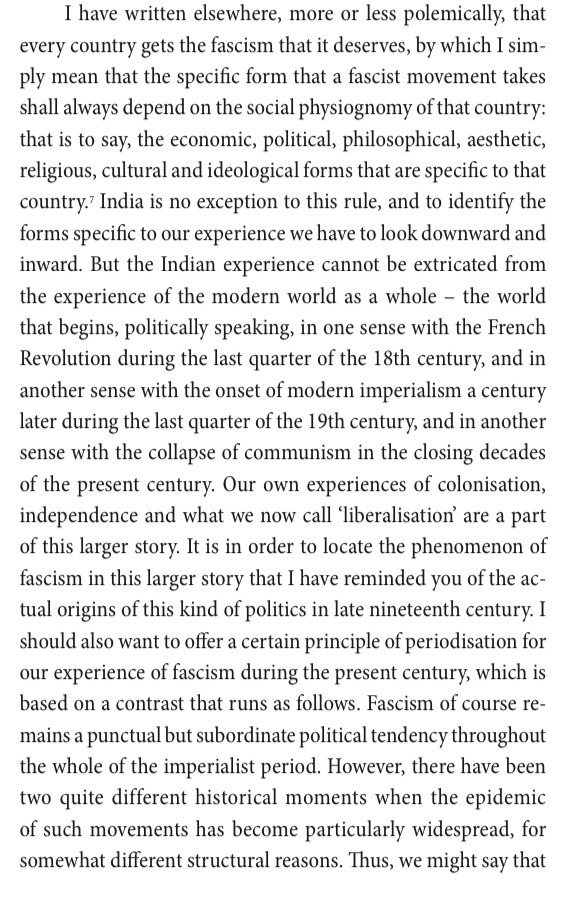
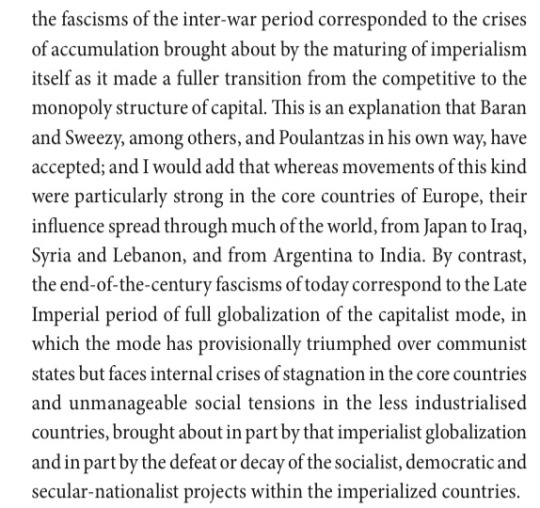
Aijaz Ahmad, “Right-Wing Politics, and The Cultures of Cruelty”, from On Communalism and Globalization
note particularly, “the end-of-the-century fascisms of today” and adjust and analyze developments accordingly
324 notes
·
View notes
Link
Ahmad Shahab, Mateena Rajput, Rehan Tariq, Simran Ahuja, Hussein Khan, Mohini Agarwal, Aijaz Dar Sagar, Kangana Rajput, Basharat Mir, Abrar ul Alam, Kaiser Para, Ishfaq Maam, Ayaan Parvez, Mohd Rafi
#Ahmad Shahab#Mateena Rajput#Rehan Tariq#Simran Ahuja#Hussein Khan#Mohini Agarwal#Aijaz Dar Sagar#Kangana Rajput#Basharat Mir#Abrar ul Alam#Kaiser Para#Ishfaq Maam#Ayaan Parvez#Mohd Rafi Bhat#Niharika Tariq#Rayees Lone#Showkat Lone#Tariq Wani#Azmat Ayoub#Yawer Reyaz#Tahir Gurezi#Syed Rehman#Waani Barkat#Tanveer Bhat#Irshad Lone
0 notes
Note
niceys positive anon!! i don't agree with you on everything but you are so clearly like well read and well rounded that you've helped me think through a lot of my own inconsistencies and hypocrises in my own political and social thought, even if i do have slightly different conclusions at times then u (mainly because i believe there's more of a place for idealism and 'mind politics' than u do). anyway this is a preamble to ask if you have recommended reading in the past and if not if you had any recommended reading? there's some obvious like Read Marx but beyond that im always a little lost wading through theory and given you seem well read and i always admire your takes, i wondered about your recs
it's been a while since i've done a big reading list post so--bearing in mind that my specific areas of 'expertise' (i say that in huge quotation marks obvsies i'm just a girlblogger) are imperialism and media studies, here are some books and essays/pamphlets i recommend. the bolded ones are ones that i consider foundational to my politics
BASICS OF MARXISM
friedrich engels, principles of commmunism
friedrich engels, socialism: utopian & scientific
karl marx, the german ideology
karl marx, wage labour & capital
mao zedong, on contradiction
nikolai bukharin, anarchy and scientific communism
rosa luxemburg, reform or revolution?
v.i lenin, left-wing communism: an infantile disorder
v.i. lenin, the state & revolution
v.i. lenin, what is to be done?
IMPERIALISM
aijaz ahmed, iraq, afghanistan, and the imperialism of our time
albert memmi, the colonizer and the colonized
che guevara, on socialism and internationalism (ed. aijaz ahmad)
eduardo galeano, the open veins of latin america
edward said, orientalism
fernando cardoso, dependency and development in latin america
frantz fanon, black skin, white masks
frantz fanon, the wretched of the earth
greg grandin, empire's workshop
kwame nkrumah, neocolonialism, the last stage of imperialism
michael parenti, against empire
naomi klein, the shock doctrine
ruy mauro marini, the dialectics of dependency
v.i. lenin, imperialism: the highest stage of capitalism
vijay prashad, red star over the third world
vincent bevins, the jakarta method
walter rodney, how europe underdeveloped africa
william blum, killing hope
zak cope, divided world divided class
zak cope, the wealth of (some) nations
MEDIA & CULTURAL STUDIES
antonio gramsci, the prison notebooks
ed. mick gidley, representing others: white views of indigenous peoples
ed. stuart hall, representation: cultural representations and signifying pratices
gilles deleuze & felix guattari, capitalism & schizophrenia
jacques derrida, margins of philosophy
jacques derrida, speech and phenomena
michael parenti, inventing reality
michel foucault, disicipline and punish
michel foucault, the archeology of knowledge
natasha schull, addiction by design
nick snricek, platform capitalism
noam chomsky and edward herman, manufacturing consent
regis tove stella, imagining the other
richard sennett and jonathan cobb, the hidden injuries of class
safiya umoja noble, algoriths of oppression
stuart hall, cultural studies 1983: a theoretical history
theodor adorno and max horkheimer, the culture industry
walter benjamin, the work of art in the age of mechanical reproduction
OTHER
angela davis, women, race, and class
anna louise strong, cash and violence in laos and vietnam
anna louise strong, the soviets expected it
anna louise strong, when serfs stood up in tibet
carrie hamilton, sexual revolutions in cuba
chris chitty, sexual hegemony
christian fuchs, theorizing and analysing digital labor
eds. jules joanne gleeson and elle o'rourke, transgender marxism
elaine scarry, the body in pain
jules joanne gleeson, this infamous proposal
michael parenti, blackshirts & reds
paulo freire, pedagogy of the oppressed
peter drucker, warped: gay normality and queer anticapitalism
rosemary hennessy, profit and pleasure
sophie lewis, abolish the family
suzy kim, everyday life in the north korean revolution
walter rodney, the russian revolution: a view from the third world
#ask#avowed inframaterialist reading group#i obviously do not 100% agree with all the points made by and conclusions reached by these works#but i think they are valuable and useful to read
1K notes
·
View notes
Note
hi! i was wondering if I could ask for resources regarding indian history and indian politics in general.
i have been blissfully unaware of most of the things happening in my country and coming across your blog made me realize how much I don't know, so i was wondering if you about resources to help educate myself and come to the right conclusions! thank you!!
I appreciate the drive to educate yourself! Here's some reading material and books for you:
Annihilation Of Caste- Dr. B.R. Ambedkar
This post by @timetravellingkitty has lots of reading material on Kashmir, including multiple perspectives.
This post has other links as well as videos on Kashmir
The Politics Of Culture- Aijaz Ahmad [it's only a few pages, a quick read]
Kancha Ilaiah Shepherd's website + writings
Google Doc on anti-hindutva resources and books made by @meerawrites
Khaki Shorts, Saffron Flags
BrownHistory on instagram and substack (substack is paywalled though)
As for news sources I'd recommend SabrangIndia, MaktoobMedia and the Wire as a good news source, always try to back up your news from independent Indian news sources. TOI and The Hindu aren't very reliable.
i have PDFs for Mafia Queens Of Mumbai (history) and Recasting Caste but you'll have to message me on discord for that lmao. I don't have them as links
SIGN THE PETITION TO HELP THE SHOMPEN- YOU DON'T NEED TO BE INDIAN TO DO THIS
is there anything specific you're looking for?
111 notes
·
View notes
Text
tagged by @amarocit <3 <3 to list 10 books I am planning to read.... ok I have so many interesting books I want to get to except then I come across book n°1047282 about psychiatry and crime in nineteen century france and I go 😺 I want to branch out my reading interests outside of psych though. you can tell I don't read much fiction these days lol
Le Désire Homosexuel, Guy Hocquenghem - I guess technically part of psych but I'm intrigued. I've wanted to read more about the FHAR for a while..... will likely be shitty in many ways but i'm easy to rope in if you mention deleuze and guattari
In Theory, Aijaz Ahmad - ok this one I actually started but im not well versed in literature theory so it's taking me a while to get through. super interesting though especially the chapter on rushdie. I want to read other texts by him, I think I have imperialism of our time downloaded
Blackshirts and Red, Michael Parenti - same as In Theory, has been in my folder for a while. actually maybe will read it after to get a better overview....
The Fetish Revisited: Marx, Freud, and the Gods Black People Make, J Lorand Matory - saw it recommended, need to find it asap
Public City/Public Sex: Homosexuality, Prostitution, and Urban Culture in Nineteenth-Century Paris, Andrew Israel Ross - ok very closely related to psych and power lol but I'm really intrigued. all I read recently outside of psych were about public health, hygiene etc. so this fits nicely
Hurricane Season, Fernanda Melchor - high praise from all angles
The Physical and the Moral: Anthropology, Physiology, and Philosophical Medicine in France, 1750–1850, Elizabeth A. Williams - recommended by a friend. likely my next reading actchually
Bolshevik Sexual Forensics: Diagnosing Disorder in the Clinic and Courtroom, 1917-1939, Dan Healey - looks like it should be either very good or very bad 👍
The Corrupter of Boys: Sodomy, Scandal, and the Medieval Clergy, Dyan Elliott - actually @amarocit shared an excerpt from it a few weeks ago and I got really curious.... very very out of my usual reading area so let's see
Boquitas Pintadas, Manuel Puig - I have a second hand copy of this one so might get to it soon <3
idk who hasn't done it yet.... I tag @nietp @transmutationisms @trans-axolotl @moshroom @mithli but no pressure
16 notes
·
View notes
Text

In Theory: Classes, Nations, Literatures (1992)
Aijaz Ahmad
7 notes
·
View notes
Text
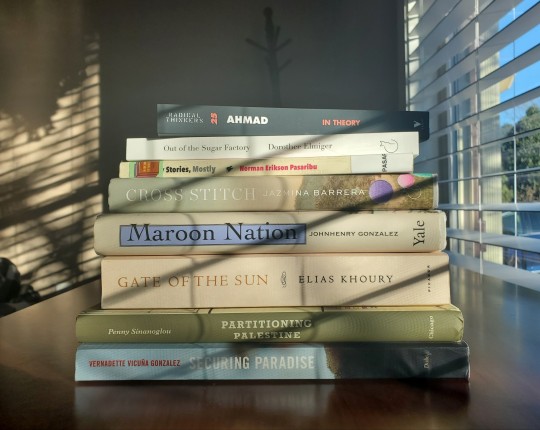

I put together a little reading list for break bc there's soooo much I want and need to read, its obviously too long and subject to the whims of my brain but some of it will be read;
cross stitch, jazmina barrera trans. christina mcsweeney
out of the sugar factory, dorothee elmiger trans. megan ewing
brotherless night, v.v. ganeshananthan
a mercy, toni morrison
happy stories, mostly, norman erikson pasaribu trans. tiffany tsao
gate of the sun, elias khoury
after the last sky: palestinian lives, edward said
discourse on colonialism, aimé césaire trans. joan pinkham
necropolitics, achille mbembe
securing paradise: tourism and militarism in hawai'i and the philippenes, vernadette vicuña gonzalez
the jakarta method: washington's anticommunist crusade and the mass murder program that shaped our world, vincent bevins
partitioning palestine: british policymaking at the end of empire, penny sinanoglou
maroon nation: a history of revolutionary haiti, johnhenry gonzalez
in theory: classes, nations, literatures, aijaz ahmad
jungle passports: fences, mobility, and citizenship at the northeast india-bangladesh border, malini sur
finally got the news: the printed legacy of the u.s. radical left, 1970–1979, ed. brad duncan
#if you have any fiction recs pls send them#this list is uncharacteristically nonfiction heavy but thats probably good too bc i always avoid nonfiction
17 notes
·
View notes
Text
Escaping the Matrix
The reality is an illusion
By Faisul Yaseen
‘Khan News Agency’ just outside the Lambert Lane on the Residency Road in Srinagar, the summer capital of Jammu and Kashmir, used to employ seven persons. Today, Hilal Ahmad is the only one running the show.
“The customer flow used to be such that none of us could take a breather during the day,” Ahmad says. “Today, I sit idle, waiting all day for the customers to turn up.”
His business of selling newspapers, magazines, and other periodicals, has been hit with the growth of e-commerce in Kashmir.
“e-commerce is doing much more damage to small-time shopkeepers than the violence of three decades in Kashmir,” he says.
As the e-commerce industry is growing in Kashmir, it is eating away the business of Micro, Small and Medium Enterprises (MSME) like local departmental stores, bookshops, clothing and footwear stores, small traders, retailers, and hawkers while wholesale profit margins are getting squeezed.
In this new world order, how will the small businesses survive?
*****

Andrew Tate, a kickboxer-turned-online influencer was recently in the news when while being arrested he said, “The Matrix has attacked me.”
When Tate mentioned ‘The Matrix’, was he making a reference to the science fiction film franchise or was he talking about the new world order?
In one of his viral videos while referring to ‘The Matrix’, he says, “They want to control us. This is what people who are in charge ever wanted from the beginning, control. They want people to comply. And you have to put systems in place to ensure people comply.”
Are those systems the new business models? And are we the people complying with those systems?
Kashmir Chamber of Commerce and Industry (KCCI) President Javid Tenga says, “There is a need to support people who are losing their livelihood due to e-commerce.”
Tenga, who had shot a letter to the Union Civil Aviation Ministry and Director General of Civil Aviation (DGCA) to stop websites of various airlines from unilaterally raising airfares on Jammu and Kashmir route, says that the government needs to place restrictions on e-commerce of certain items to protect the interests of small traders.
Rescuing small businesses in a place like J&K assumes importance considering that at least 1.82 lakh youth who do not have any jobs are registered with the government.
*****
Chairman of PHD Chamber of Commerce and Industry (PHDCCI), Kashmir, Vicky Shaw says, “The dimensions of business are changing.”
He suggests small businesses to get associated with big companies and become their suppliers.
Shaw also recommends small traders to register their businesses on the Government of India’s Open Network Digital Commerce (ONDC) app for easy marketing of their products.
“People have to move on,” Shaw says.
Coordinator Directorate of Internal Quality Assurance (DIQA) of the University of Kashmir (KU), Aijaz Akbar Mir concurs with Shaw.
According to Mir, who specialises in Management and Organisational Behaviour, Human Resource Management, Human Resource Development and Industrial Relations, the small traders need to come up with “innovations” and “redesign” or “perish”.
“Change is important. What is relevant today may not be relevant tomorrow,” Mir says. “Small traders need to add more products and go for home delivery.”
Coordinator MBA Financial Management at KU’s School of Business Studies, Irshad Ahmad Malik questions whether small businesses were offering what customers want.
“They are not shifting to the alternate mechanism,” he says. “They also need to lure customers with discounts and go for hybrid mode of sales – both online and in store.”
*****
In a time of gloom at the shop fronts, is the government doing anything for helping the small businesses?
Director Industries and Commerce, Kashmir, Mahmood Ahmad Shah says, “There is nothing in the industrial policy. This comes under rehabilitation.”
However, Shah, who is also Director Handicrafts and Handloom, says that the government is incentivising e-commerce in the handicrafts sector.
When merchants, who usually fight with each other, feel an existential threat at the hands of the “common enemy” e-commerce, the role of the government and the quasi-government institutions like J&K Bank, which has for long been the lifeline of the local economy, becomes all the more important.
Editor of the J&K Bank and its Head of Internal Communication and Knowledge Management (IC&KM) Department, Sajjad Bazaz says, “It is all up to the business plan of the shopkeepers.”
He says that the loan limit given by the bank depends on the working capital.
“Many small traders have already started e-commerce but it only accounts for around 40 percent of the sales while 60 percent customers still visit the stores for a personal experience,” Bazaz says.
*****

In the 1999 Hollywood movie, ‘The Matrix’ that Tate makes references to, Morpheus, a rebel leader played by Laurence Fishburne tells the protagonist Neo, who is played by Keanu Reeves, “The Matrix is a system, Neo. That system is our enemy. But when you're inside, you look around, what do you see? Businessmen, teachers, lawyers, carpenters. The very minds of the people we are trying to save. But until we do, these people are still a part of that system and that makes them our enemy. You have to understand, most of these people are not ready to be unplugged. And many of them are so inured, so hopelessly dependent on the system, that they will fight to protect it.”
Are we those hopelessly dependent people who are fighting to protect this world order?
In ‘The Matrix’ Morpheus gives Neo two options, “This is your last chance. After this, there is no turning back. You take the blue pill - the story ends, you wake up in your bed and believe whatever you want to believe. You take the red pill - you stay in Wonderland and I show you how deep the rabbit hole goes.”
Do we have options like Neo and what are those options?
Writer and speaker, Sofo Archon in ‘Escaping the Matrix: 8 Ways to Deprogram Yourself’ writes, “Think of the way most people live: They force themselves to wake up early in the morning, dress up, drive straight to some workplace, spend 8 hours or so doing work they hate, drive back home, surf the Internet or watch TV, and then go to sleep, only to repeat the same routine the next day for almost the rest of their lives.”
For escaping ‘The Matrix’, he suggests breaking the shackles of dogmas, stopping giving your power away to external authority, questioning the dominant economic system, detaching yourself from consumerism, being aware of the media, choosing food carefully, reading eye-opening books, and developing mindfulness.
Archon writes that habits, tradition, and dogmas have turned us into mindless automatons that follow a predetermined path that was forced upon us.
*****
Chairman J&K Hoteliers Club Mushtaq Chaya says that there is a need to change these habits and old traditions.
“Shopkeepers have to become smart,” he says. “The people who are making a fortune out of e-commerce are smart people who used to run small businesses like these shopkeepers.”
However, Chaya calls for extending all possible help to these small traders who are finding it difficult to jump the bandwagon of e-commerce.
Like Chaya, President of Chamber of Commerce and Industry, Kashmir (CCIK), Tariq Rashid Ghani also suggests extending a helping hand to the small businesses keeping in mind the past three decades of turmoil in J&K.
“The traditional shop-keeping has come to an end,” he says. “The government needs to promote local items.”
*****
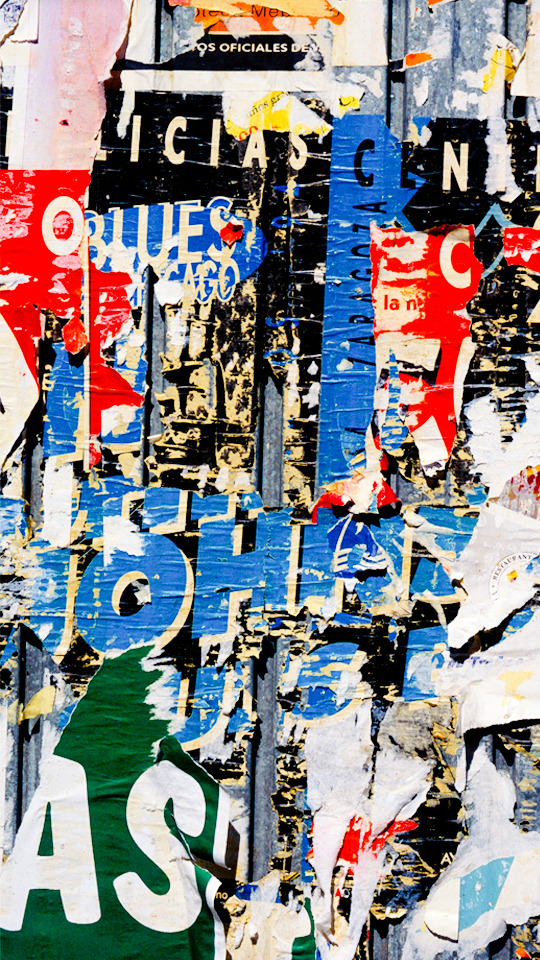
Nikki Baird in her write up ‘Retail in the 2020s: The Death of Consumerism’ for the ‘Forbes’ writes that the consumers should become sensitive to environment footprints; repair and maintenance sector would grow; businesses should deliver experiences; and traders should rethink how their businesses are organised, rework brand strategies, and remodel stores.
On April 17 last year at the unveiling of a 108-foot tall statue of Hanuman in Morbi, Gujarat, Prime Minister Narendra Modi said: “At our homes, we should only use things made by our people. Imagine the number of people who will get employment due to this. We may like foreign-made goods but these things don’t have the feel of the hard work of our people. In the next 25 years, if we just use local products, there won’t be unemployment for our people.”
In times of brand junkies, in times when duds backed by rich parents go on to become entrepreneurs, extending an olive branch to the small traders would be a revolutionary act.
*****
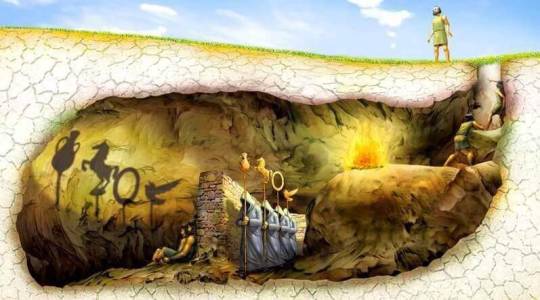
Greek philosopher Plato in the ‘Allegory of the Cave’ in his work ‘Republic’ describes a group of people who have lived all their lives in a cave. Chained to pillars, they can only see shadows cast on the back wall by a fire burned behind them. These shadows are mere illusions. When one of these men breaks out, he discovers a new world. On returning to the cave, he tells the other men about the reality but they reject it and resent him because reality is an illusion for them and illusion a reality.
However, Friedrich Nietzsche in his book Twilight of the Idols argues that if this ‘reality’ was completely unknowable and beyond grasp, what use could it possibly be.
Sheikh Aijaz, who runs Gulshan Books store at the Residency Road in Srinagar, says that a new reality has already dawned as fewer people were turning up to purchase books at stores.
“Most people now order books from e-commerce sites,” says Aijaz who compensates for the loss of business at the store with ‘Gulshan Books Publishing House’, a vertical the family started years back.
The 17th century French philosopher Rene Descartes in his ‘Meditations on First Philosophy’ suggests that the entire human world is but a world of shadows orchestrated by a deceitful “evil genius”.
Not wanting to chase the shadows, millennials across the world may not be buying diamonds, ‘vocal for local’ may be the in thing in India, but are we ready for putting in an effort to make the change.

Do you want to take the blue pill, or do you want to take the red pill?
The choice is yours.
3 notes
·
View notes
Text
Mysterious Disease: After 17 Deaths, Youth From Badhal Shifted To GMC Rajouri
Mysterious Disease: After 17 Deaths, Youth From Badhal Shifted To GMC Rajouri CM Omar Visits Bereaved Families, Promises Justice And Support Jammu, Jan 21: Amid 17 deaths due to a mysterious disease in Badhal area of Budhal village, a youth in his early 20s from the village has been shifted in critical condition to GMC in Rajouri, officials said. They said that the youth identified as Aijaz Ahmad…
0 notes
Text
Clear Sight Creates Clear Motion: Reflections After In Theory by Aijaz Ahmad
By Anastasia Mentar I quite enjoyed reading In Theory by Aijaz Ahmad. The book was quite timely for the early ‘90s when it was published and addresses issues with the Three Worlds Theory especially in the wake of the fall of the Soviet Union and the neutralization of communist countries around the world. While this may not seem very relevant today given the almost total abandonment of the use of…
0 notes
Text
it's been in my head ever since reading it, that bit in Aijaz Ahmad's book, In Theory, where he rhetorically asks why there's so little 20th century American literature that treats of the shift from a production to a managerial economy. that's science fiction! Someone should've given that man some back issues of Astounding, some Heinlein or some Sturgeon.
1 note
·
View note
Text
Cultural domination is doubtless a major aspect of imperialist domination as such, and 'culture' is always, therefore, a major site for resistance, but cultural contradictions within the imperialized formations tend to be so very numerous - sometimes along class lines but also in cross-class configurations, as in the case of patriarchal cultural forms or the religious modes of social authorization - that the totality of indigenous culture can hardly be posited as a unified, transparent site of anti-imperialist resistance.
The difficulties of analytic procedure which arise from such complexities of the object of analysis itself are further compounded by the verv modes of thought which are currently dominant in literary debates and which address questions of colony and empire from outside the familiar Marxist positions, often with great hostility towards and polemical caricature of those positions. First, the term 'culture is often deployed as a very amorphous category - sometimes in the Arnoldian sense of 'high' culture; sometimes in the more contemporary and very different sense of 'popular culture; in more recent inflations that latter term, taken over from Anglo-American sociologies of culture, has been greatly complicated by the equally amorphous category of 'Subaltern consciousness which arose initially in a certain avant-gardist tendency in Indian historiography but then gained currency in metropolitan theorizations as well. Meanwhile, the prior use of the term 'cultural nationalism', and of other cognate terms of this kind, in Black American literary ideologies since the mid 1960s - not to speak of the Negritude poets of Caribbean and African origins, the Celtic and nativist elements in Irish cultural nationalism, or the Harlem Renaissance in the United States - then endows the term, as it is used in American literary debates, with another very wide range of densities. Used in relation to the equally problematic category of 'Third World', 'cultural nationalism' resonates equally frequently with tradition', simply inverting the tradition/modernity binary of the modernization theorists in an indigenist direction, so that 'tradition' is said to be, for the 'Third World', always better than 'modernity', which then opens up a space for defence of the most obscurantist positions in the name of cultural nationalism. There appears to be, at the very least, a widespread implication in the ideology of cultural nationalism, as it surfaces in literary theory, that each 'nation' of the Third World' has a 'culture and a 'tradition', and that to speak from within that culture and that tradition is itself an act of anti-imperialist resistance. By contrast, the principal trajectories of Marxism as they have evolved in the imperialized formations have sought to struggle - with varying degrees of clarity or success, of course - against both the nation/ culture equation, whereby all that is indigenous becomes homogenized into a singular cultural formation which is then presumed to be necessarily superior to the capitalist culture which is identified discretely with the 'West', and the tradition/modernity binary, whereby each can be constructed in a discrete space and one or the other is adopted or discarded.
Aijaz Ahmad, In Theory
#aijaz ahmad#looking at this it’s actually ‘funny’ (you know not haha funny like chortle chortle uuuugh funny)#that I consider reading this text a personal ‘back to basics’
112 notes
·
View notes
Text
Tagesaktuell vom 29. Juni 2024 http://www.schattenblick.de/infopool/infopool.html
HEGEMONIE/1843: Antimilitarismus in Zeiten des Krieges … (SB) http://www.schattenblick.de/infopool/politik/kommen/hege1843.html
KRIEG/1803: Krieg im Nahen Osten … (SB) http://www.schattenblick.de/infopool/politik/kommen/volk1803.html
INTERVIEW/479: Chronometer links-irischer Geschichte … Helena Sheehan im Gespräch (SB) http://www.schattenblick.de/infopool/politik/report/prin0479.html
KLIMA/775: Klimastrategie Wasserstoff … (SB) http://www.schattenblick.de/infopool/umwelt/redakt/umkl-775.html
KOMMENTAR/297: An der Kette der Weltmächte … (SB) http://www.schattenblick.de/infopool/sport/meinung/spmek297.html
REZENSION/037: Sabine Kuegler - Ich schwimme nicht mehr da, wo die Krokodile sind (SB) http://www.schattenblick.de/infopool/buch/biograph/bubir037.html
REZENSION/779: Meinhard Creydt - Der Foucault-Ismus (SB) http://www.schattenblick.de/infopool/buch/sachbuch/busar779.html
REZENSION/780: Jürgen Meier - Vom Kopf auf die Füße (SB) http://www.schattenblick.de/infopool/buch/sachbuch/busar780.html
REZENSION/781: Aijaz Ahmad - Der Imperialismus unserer Tage (SB) http://www.schattenblick.de/infopool/buch/sachbuch/busar781.html
REZENSION/782: Theisen/Donat (Hrsg.) - Bedrohter Diskurs (SB) http://www.schattenblick.de/infopool/buch/sachbuch/busar782.html
REZENSION/783: Jürgen Tautz - Auch Bienen haben Schweißfüße (SB) http://www.schattenblick.de/infopool/buch/sachbuch/busar783.html
SCHACH-SPHINX/07360: Vieles ging verloren (SB) http://www.schattenblick.de/infopool/schach/schach/sph07360.html
SCHACH-SPHINX/07361: Die Enttäuschung naht mit großen Schritten (SB) http://www.schattenblick.de/infopool/schach/schach/sph07361.html
REZENSION/025: Karsten Müller - Typisch Damengambit (SB) http://www.schattenblick.de/infopool/schach/schach/srez0025.html
REZENSION/029: Matthias Aumüller - Das Schachspiel in der europäischen Literatur (SB) http://www.schattenblick.de/infopool/schach/schach/srez0029.html
REZENSION/030: Tahar Rouissi - Zu Gast bei der fantastischen Schachfamilie (SB) http://www.schattenblick.de/infopool/schach/schach/srez0030.html
WETTER/9047: Und morgen, den 30. Juni 2024 (SB) http://www.schattenblick.de/infopool/dienste/wetter/wett9047.html
TIERGESCHICHTEN/023: Gefangen … (SB) http://www.schattenblick.de/infopool/kind/geschi/kgti0023.html
ELTERN/292: Sigmar Schollak - Das Mädchen aus Harrys Straße (SB) http://www.schattenblick.de/infopool/kind/lesen/klel0292.html
TIERE/152: Die Kuh - mehr als nur ein Milchlieferant … (SB) http://www.schattenblick.de/infopool/kind/natur/knti0152.html
COMIC STRIP/0199: Hartze - Stöpsel … (SB) http://www.schattenblick.de/infopool/unterhlt/comic/uccm0199.html
COMIC STRIP/0200: Magus Rolf - Zauberstand … (SB) http://www.schattenblick.de/infopool/unterhlt/comic/uccm0200.html
0 notes
Text
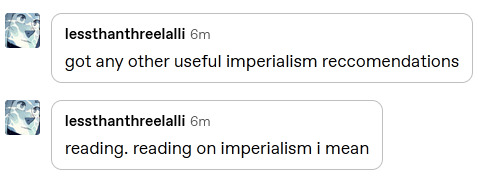
@lessthanthreelalli
vladimir lenin, imperialism: the highest stage of capitalism
eduardo galeano, the open veins of latin america
william blum, killing hope
kwame nkrumah, neocolonialism: the last stage of imperialism
walter rodney, how europe underdeveloped africa
zak cope, divided world divided class
zak cope, the wealth of (some) nations
ed. aijaz ahmad, che on socialism and internationalism
frantz fanon, the wretched of the earth
greg grandin, empire's workshop
ruy mauro marini, dialectics of dependency
regis tove, imagining the other: the representation of the papua new guinean subject
#tattletxt#the latter is more concerned with the cultural reprensetaitons and discourses of imperialism but i think thats precisely why its good
512 notes
·
View notes
Text
Former Sarpanch shot dead, Rajasthan couple injured in separate militant attacks in South Kashmir
SRINAGAR — A former Sarpanch was shot dead while a tourist couple from Rajasthan suffered injuries in separate militant attacks in South Kashmir last night. Reports said, a former Sarpanch affiliated with the ruling Bharatiya Janata Party (BJP) identified as Aijaz Ahmad Sheikh was critically injured after fired upon by suspected militants in Heerpora area of Shopian district. He was rushed to…

View On WordPress
0 notes
Text
in theory by aijaz ahmad was super illuminating and thought provoking on a ton of topics but it also served as a side effect to help me understand a bit better wtf was going on with all those french intellectual types who became white maoists post 1968
5 notes
·
View notes